Prohibition and Its Consequences
Weighing the Evidence
All documents and text associated with this activity are printed below, followed by a worksheet for student responses.Introduction
The enactment of the 18th Amendment in 1919 was the result of years of lobbying from national religious and temperance groups, as well as from individual petitions to the government. While enacted to protect individuals and families from the scourge of drunkenness, the Act had unintended consequences. You will study the artifacts and decide whether Prohibition was government protection of the individual and family, or unwarranted intrusion into people’s private lives by the U.S. government.Name:
Class:
Class:
Worksheet
Prohibition and Its Consequences
Weighing the Evidence
Examine the documents and text included in this activity. Consider how each document does or does not support two opposing interpretations or conclusions. Fill in the topic or interpretations if they are not provided. To show how the documents support the different interpretations, enter the corresponding document number into the boxes near the interpretation. Write your conclusion response in the space provided. Interpretation 1
Prohibition was government protection of the individual and family.
Prohibition was government protection of the individual and family.
Prohibition, Individual Rights and Government Protection
Interpretation 2
Prohibition was unwarranted intrusion into people's private lives.
Prohibition was unwarranted intrusion into people's private lives.
1
Activity Element
Joint Resolution Proposing the Eighteenth Amendment to the United States Constitution
Page 1
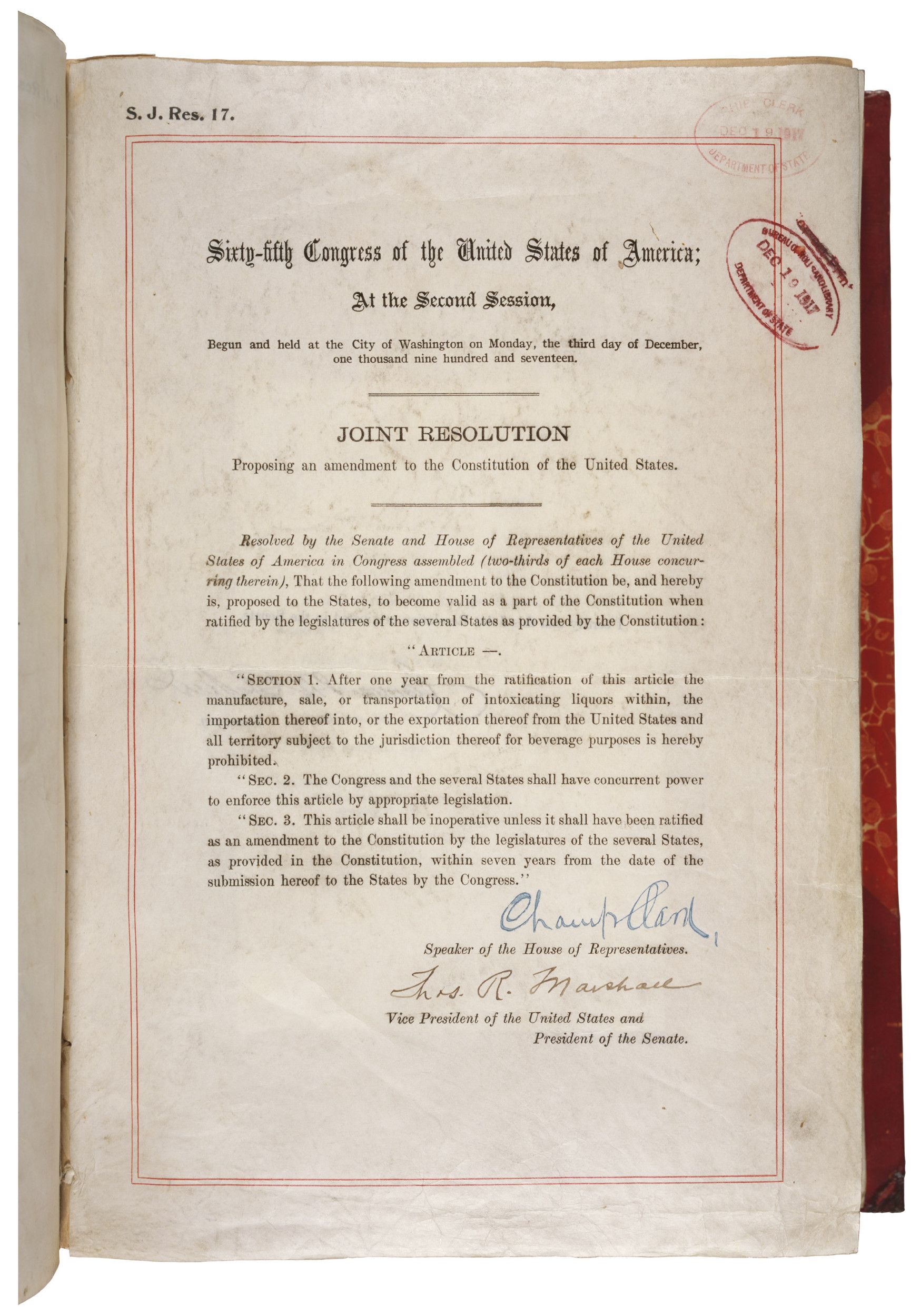
2
Activity Element
Act of October 28, 1919 [Volstead Act]
Page 1
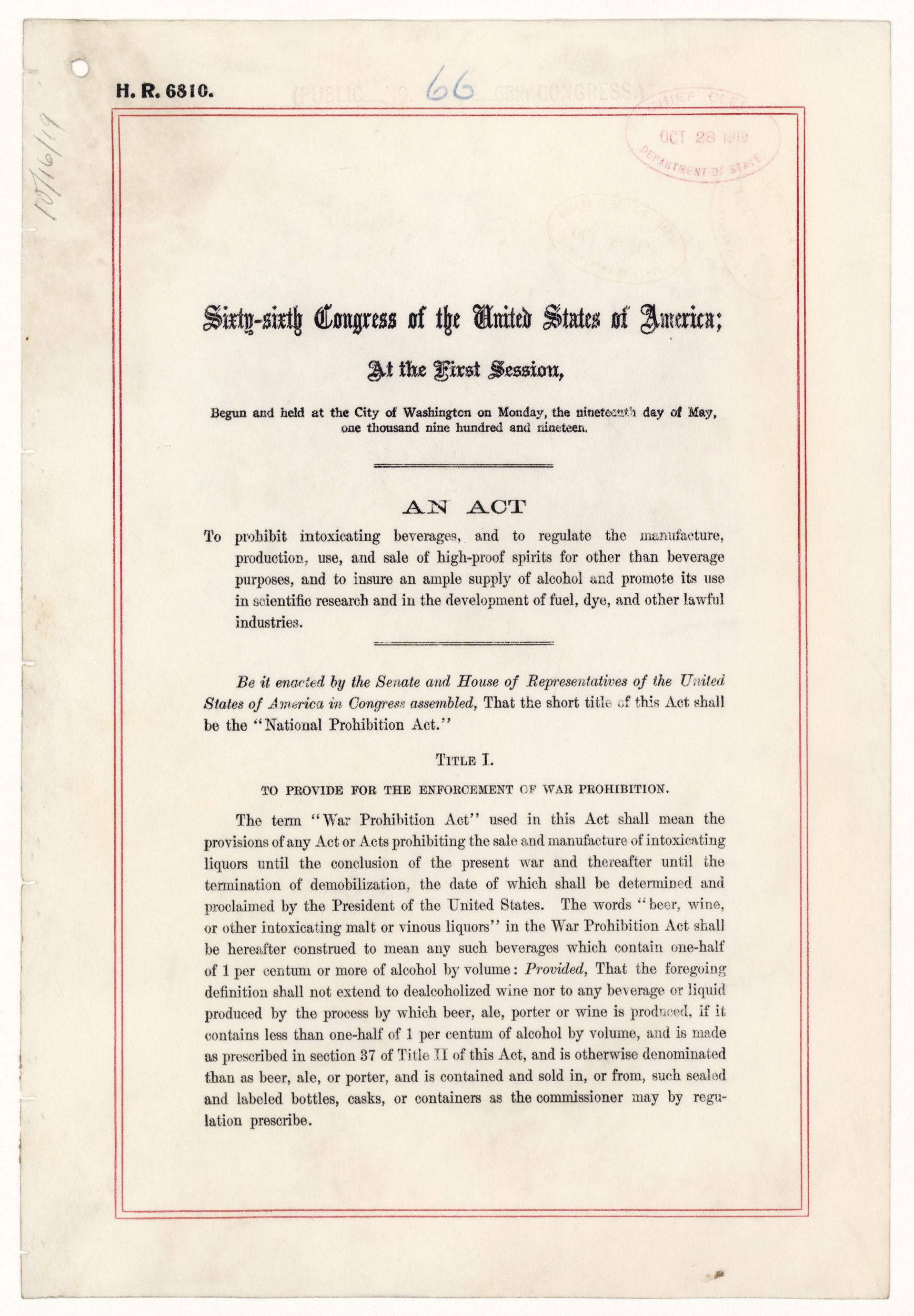
3
Activity Element
Detroit police inspecting equipment found in a clandestine underground brewery during the prohibition era
Page 1

4
Activity Element
Letter from Mrs. Hillyer concerning her husband's drinking activities.
Page 1
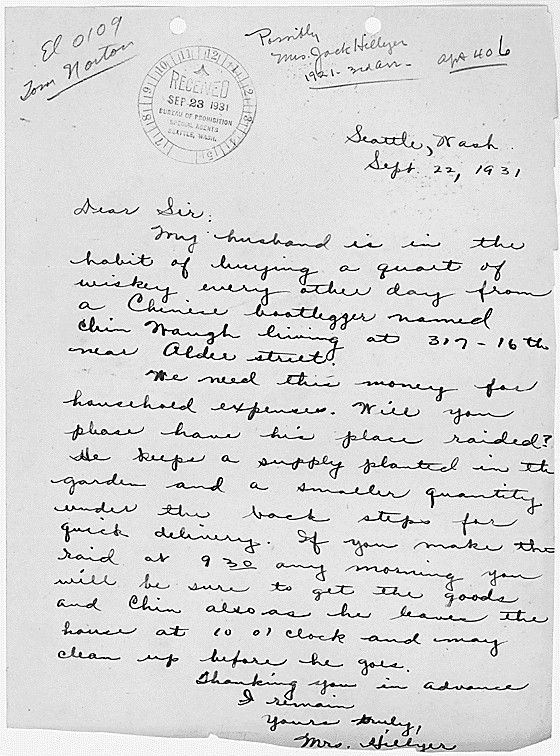
5
Activity Element
Speaking of Superfluous Starlings
Page 1
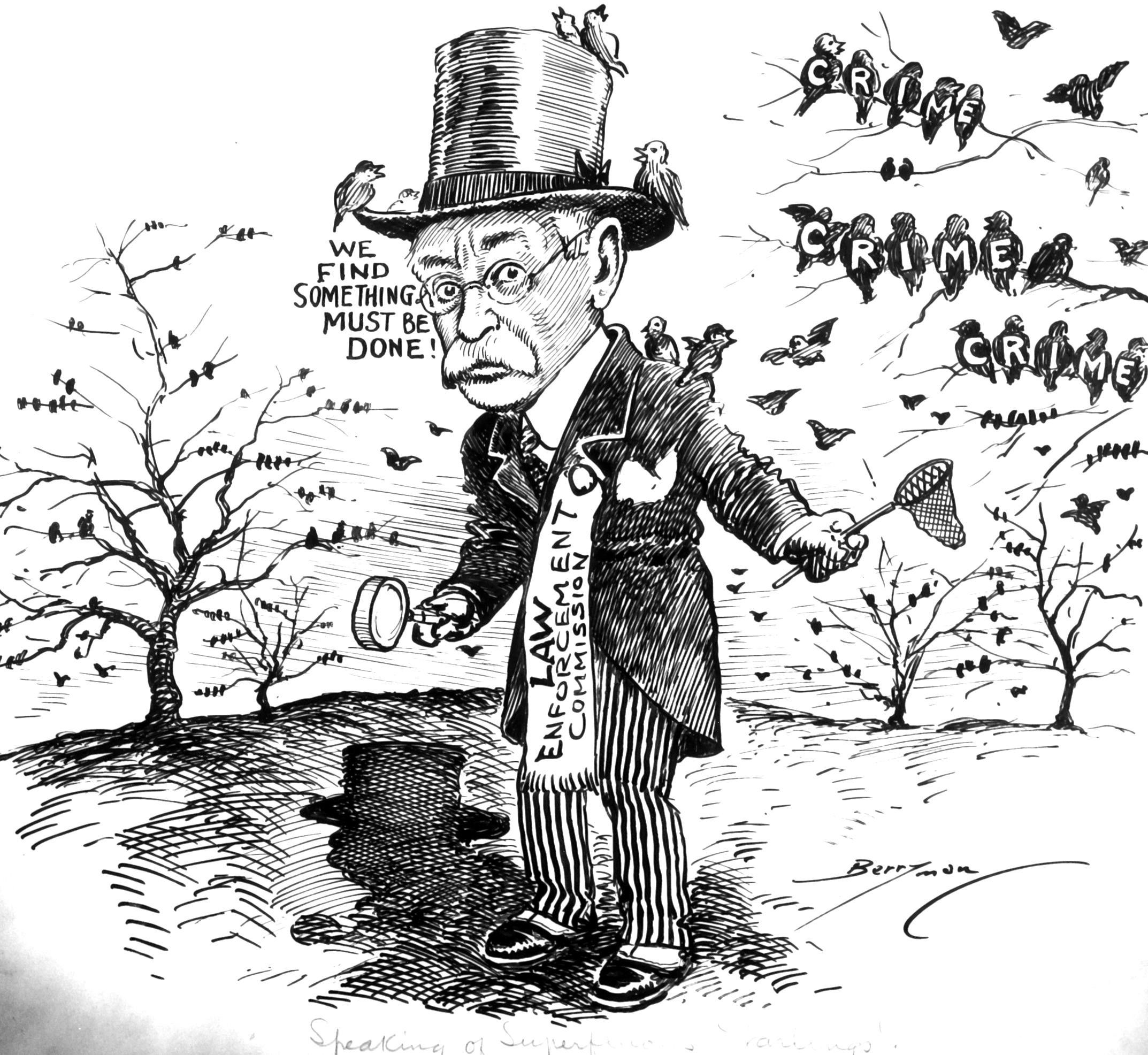
6
Activity Element
A Message to the President and the Congress of the United States of America from the National Service and War-Time Commissions of the American Churches
Page 1
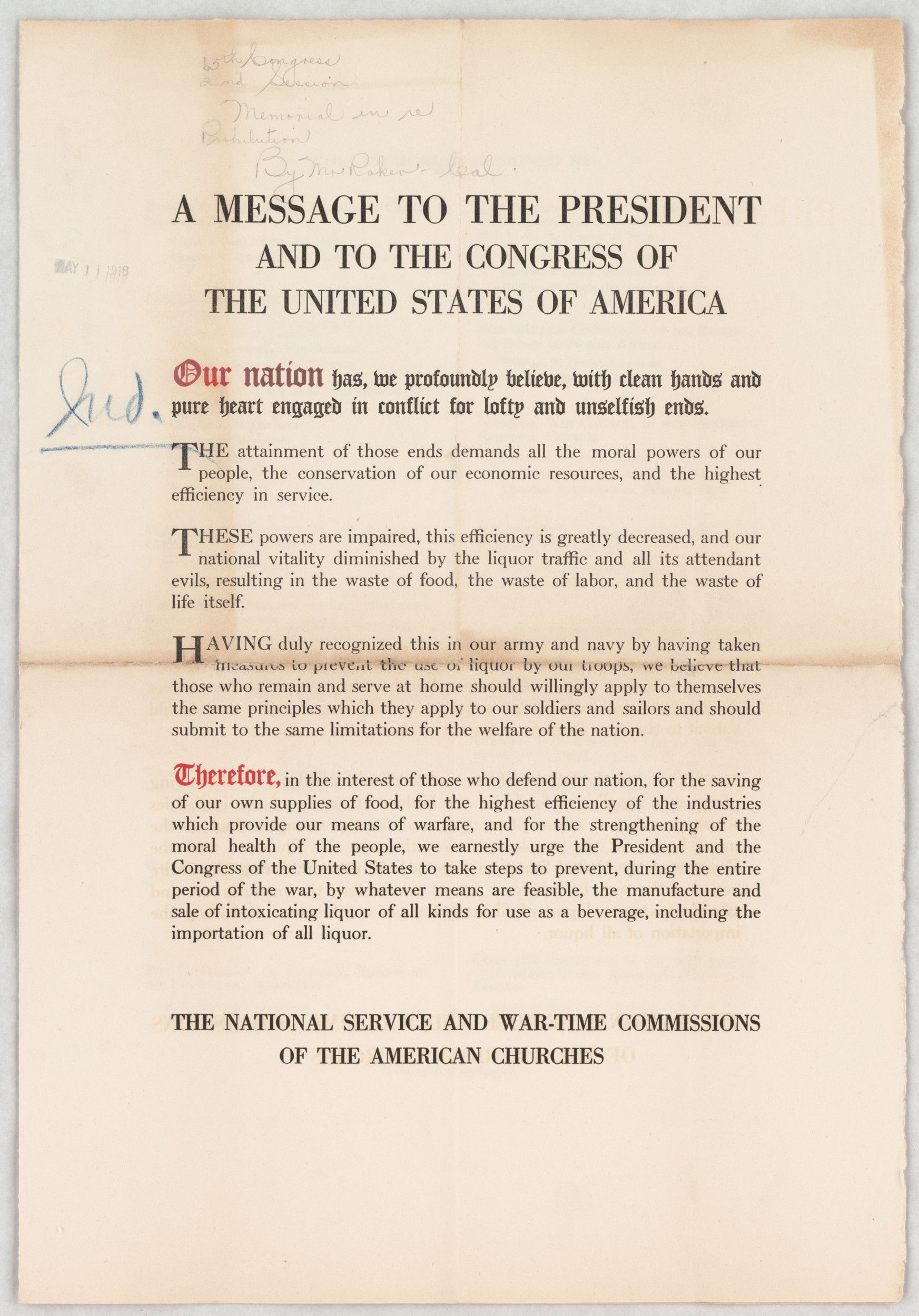
7
Activity Element
Prescription for Whiskey for I. F. Johnson
Page 1

8
Activity Element
Dr. L. E. Keeley's Double Chloride of Gold Cure for Drunkenness Label
Page 1
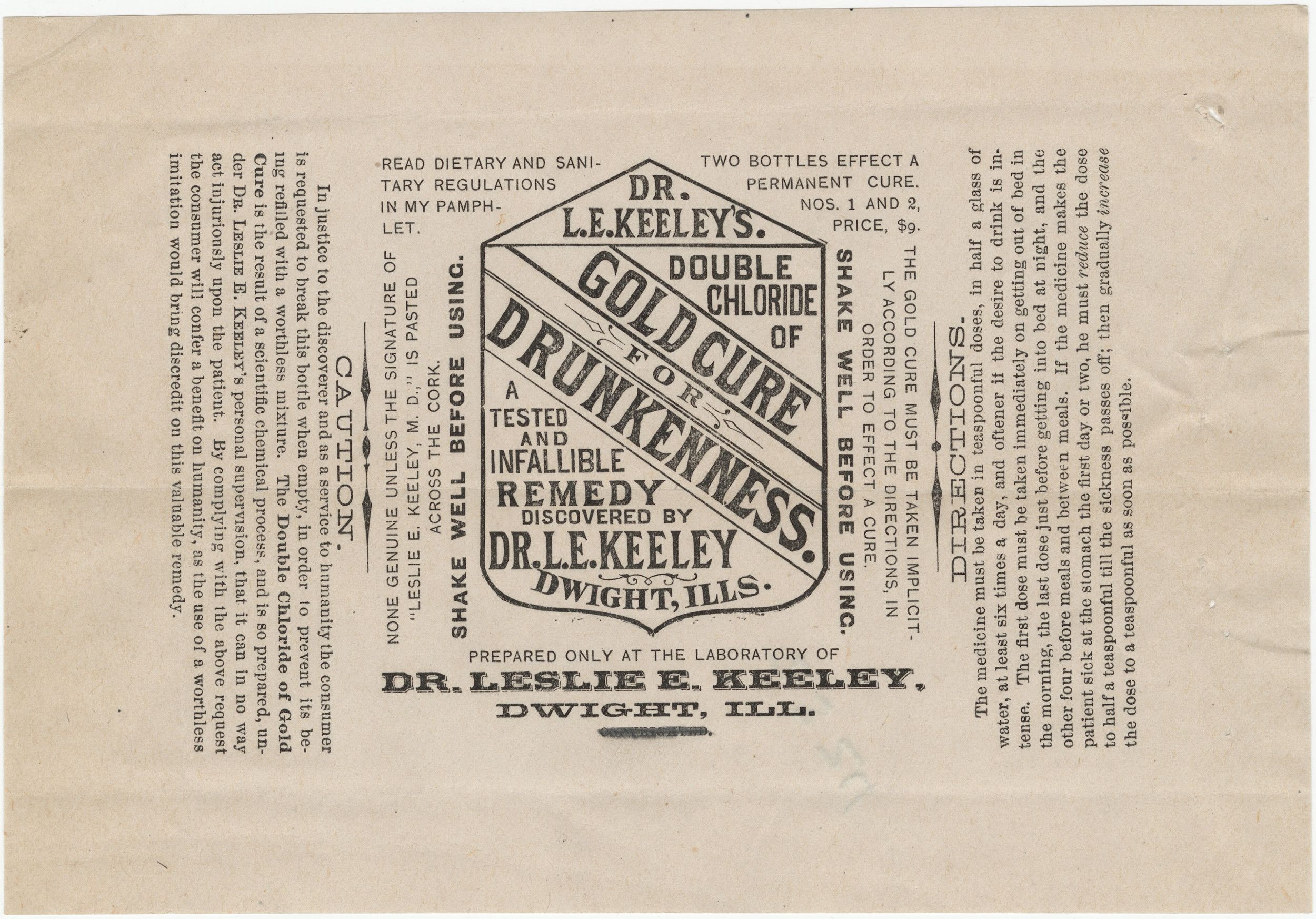
9
Activity Element
An Automobile Decked Out with Signs and Banners Supporting the Repeal of the 18th Amendment
Page 1

10
Activity Element
Letter from Women's Committee for Repeal of the 18th Amendment to the United States Congress Regarding the Repeal of Prohibition
Page 1
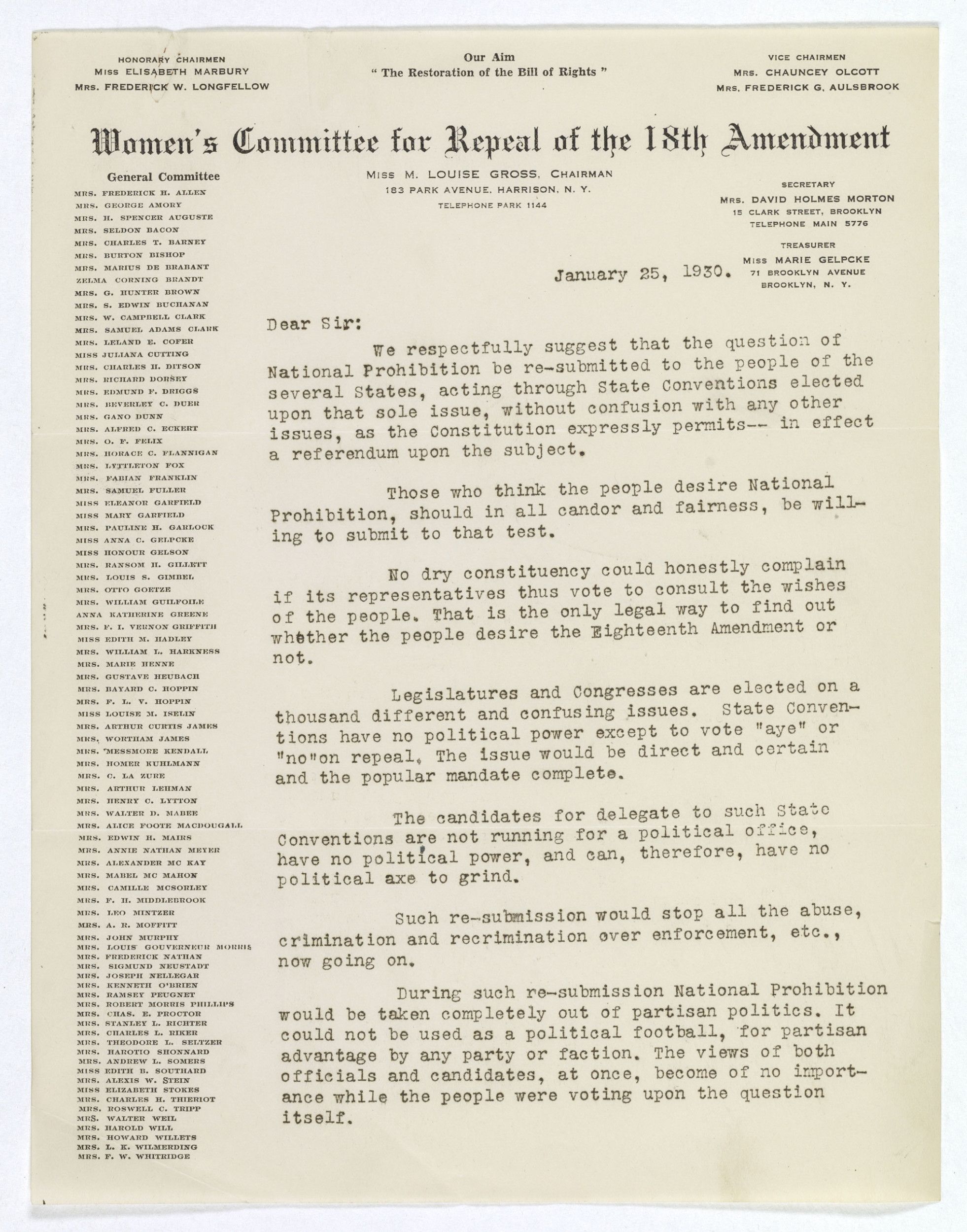
11
Activity Element
Presidential Proclamation 2065 in which President Franklin D. Roosevelt announces the Repeal of Prohibition
Page 1
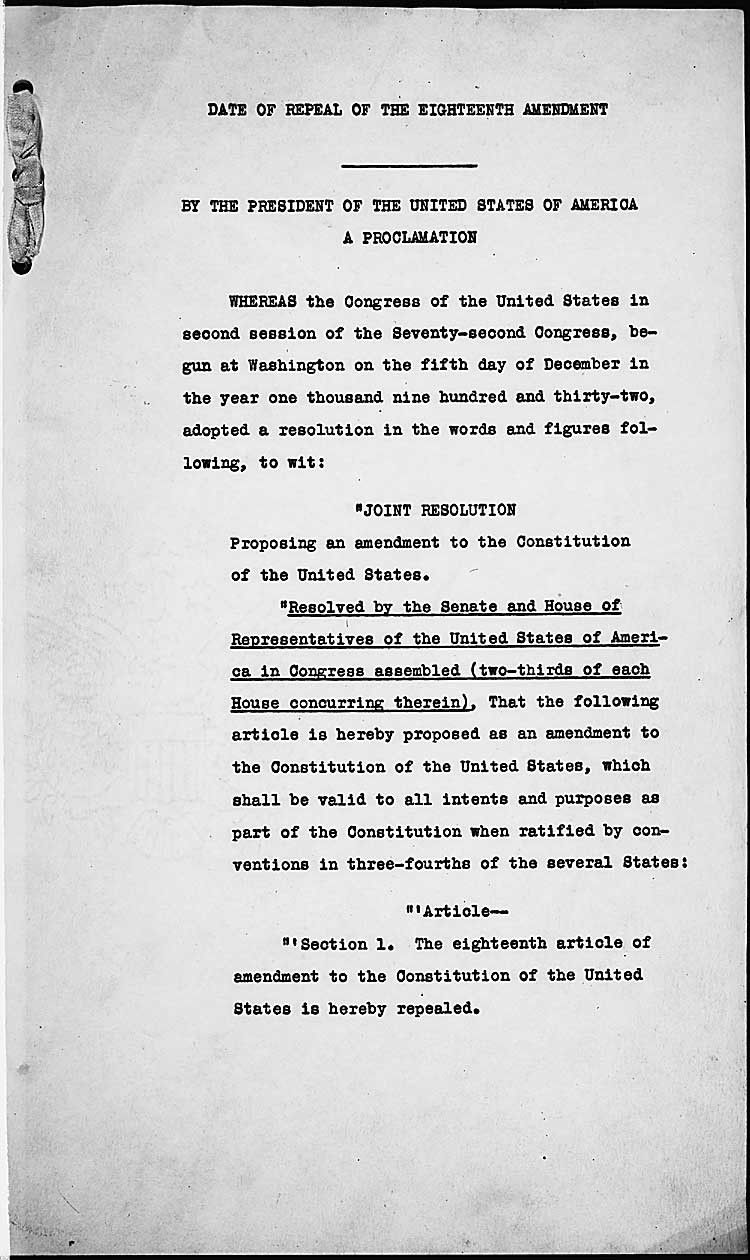
Conclusion
Prohibition and Its Consequences
Weighing the Evidence
You have seen a number of artifacts which give evidence of the pros and cons of national Prohibition. On which side of the scale did most of your evidence fall? Now that you have completed your research, consider the following questions:- Why did you tip the scale the way you did?
- Was Prohibition a success or not? Why?
- What lessons from Prohibition can be brought to bear on today’s movement to legalize marijuana?
Your Response
Document
Joint Resolution Proposing the Eighteenth Amendment to the United States Constitution
12/18/1917
This joint resolution proposed the Eighteenth Amendment. A joint resolution is a formal opinion adopted by both houses of the legislative branch. A constitutional amendment must be passed as a joint resolution before it is sent to the states for ratification.
This resolution was submitted to the states on December 18, 1917, proposed amending the U.S. Constitution to prohibit the “manufacture, sale, or transportation of intoxicating liquors.” The amendment was ratified on January 16, 1919. “Prohibition” ended in 1933 when the 21st Amendment repealed the 18th.
This resolution was submitted to the states on December 18, 1917, proposed amending the U.S. Constitution to prohibit the “manufacture, sale, or transportation of intoxicating liquors.” The amendment was ratified on January 16, 1919. “Prohibition” ended in 1933 when the 21st Amendment repealed the 18th.
This primary source comes from the General Records of the United States Government.
National Archives Identifier: 596355
Full Citation: Joint Resolution Proposing the Eighteenth Amendment to the United States Constitution; 12/18/1917; Enrolled Acts and Resolutions of Congress, 1789 - 2011; General Records of the United States Government, ; National Archives Building, Washington, DC. [Online Version, https://www.docsteach.org/documents/document/18th-amendment, April 26, 2024]Joint Resolution Proposing the Eighteenth Amendment to the United States Constitution
Page 1
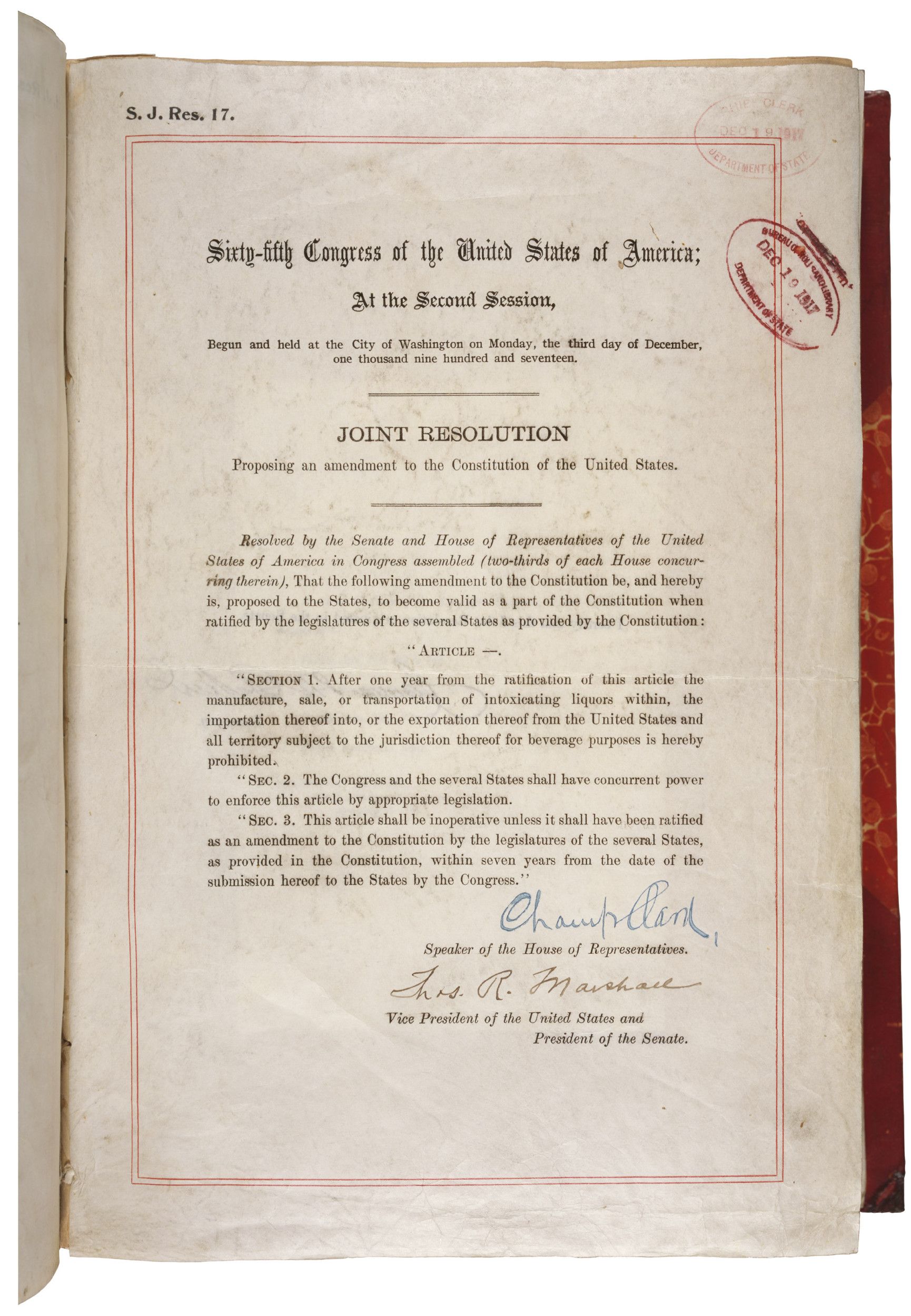
Document
Act of October 28, 1919 [Volstead Act]
10/28/1919
The Volstead Act implemented and provided an enforcement apparatus for the 18th Amendment, that prohibited "the manufacture, sale, or transportation of intoxicating liquors."
The amendment hadn't defined "intoxicating liquors," alcohol-related criminal activity, or what, if any, exceptions would be made to prohibition. These specifics were left to Congress, which passed the National Prohibition Act, often called the Volstead Act. President Woodrow Wilson vetoed the bill, but it was passed again and became law on October 28, 1919, only two months before Prohibition took effect.
The Volstead Act set a strict limit on alcohol content of .5 percent; criminalized the manufacture and sale (but not the consumption) of alcoholic beverages; and allowed for home manufacture and alcohol for medicinal and religious use. It also set stiff penalties for violations. A first conviction could result in a fine up to $1,000 and imprisonment up to six months. Property used in breaking the law could be seized.
Enforcing Prohibition was difficult and expensive, however. The long coastlines and borders of the United States aided smugglers. Bootleggers devised ingenious ways and places to make and sell alcohol. Law enforcement was underfunded and sometimes corrupt. Those arrested were often low-level violators.
As the cost of prohibition enforcement rose and the organized crime and violence associated with bootlegging gained more press coverage, support grew dramatically for repealing the 18th Amendment—or at least modifying the Volstead Act. Supporters argued that making alcohol legal again would provide jobs and taxes needed during the Great Depression and re-establish respect for the law. In 1933, the 21st Amendment repealed the 18th Amendment.
The amendment hadn't defined "intoxicating liquors," alcohol-related criminal activity, or what, if any, exceptions would be made to prohibition. These specifics were left to Congress, which passed the National Prohibition Act, often called the Volstead Act. President Woodrow Wilson vetoed the bill, but it was passed again and became law on October 28, 1919, only two months before Prohibition took effect.
The Volstead Act set a strict limit on alcohol content of .5 percent; criminalized the manufacture and sale (but not the consumption) of alcoholic beverages; and allowed for home manufacture and alcohol for medicinal and religious use. It also set stiff penalties for violations. A first conviction could result in a fine up to $1,000 and imprisonment up to six months. Property used in breaking the law could be seized.
Enforcing Prohibition was difficult and expensive, however. The long coastlines and borders of the United States aided smugglers. Bootleggers devised ingenious ways and places to make and sell alcohol. Law enforcement was underfunded and sometimes corrupt. Those arrested were often low-level violators.
As the cost of prohibition enforcement rose and the organized crime and violence associated with bootlegging gained more press coverage, support grew dramatically for repealing the 18th Amendment—or at least modifying the Volstead Act. Supporters argued that making alcohol legal again would provide jobs and taxes needed during the Great Depression and re-establish respect for the law. In 1933, the 21st Amendment repealed the 18th Amendment.
Transcript
Sixty-sixth Congress of The United States of America;At the First Session,
Begun and held at the City of Washington on Monday, the nineteenth day of May, one thousand nine hundred and nineteen.
AN ACT
To prohibit intoxicating beverages, and to regulate the manufacture, production, use, and sale of high-proof spirits for other than beverage purposes, and to insure an ample supple of alcohol and promote its use in scientific research and in the development of fuel, dye, and other lawful industries.
Be it enacted by the Senate and House of Representatives of the Unites States of America in Congress assembled, That the short title of this Act shall be the "National Prohibition Act."
Title I.
To Provide For The Enforcement Of War Prohibition.
The term "War Prohibition Act" used in this Act shall mean the provisions of any Act or Acts prohibiting the sale and manufacture of intoxicating liquors until the conclusion of the present war and thereafter until the termination of demobilization, the date at which shall be determined and proclaimed by the President of the United States. The words "beer, wine, or other intoxicating malt or vinous liquors" in the War Prohibition Act shall be hereafter construed to mean any such beverages which contain one-half of 1 per centum or more of alcohol by volume: Provided, That the foregoing definition shall not extend to dealcoholized wine nor to any beverage or liquid produced by the process by which beer, ale, porter or wine is produced, if it contains less than one-half of 1 per centum of alcohol by volume, and is made as prescribed in section 37 of Title II of this Act, and is otherwise denominated than as beer, ale, or porter, and is contained and sold in, or from, such sealed and labeled bottles, casks, or containers as the commissioner may by regulation prescribe.
H.R. 6810-4
Sec. 6. If any section or provision of this Act shall be held invalid, it is herby provided that all other provisions of this Act which are not expressly held to be invalid shall continue in full force and effect.
Sec. 7. None of the provisions of this Act shall be construed to repeal any provisions of the "War Prohibition Act", or to limit or annul any order or regulation prohibiting the manufacture, sale, or disposition of intoxicating liquors within certain prescribed zones or districts, nor shall the provisions of this Act be construed to prohibit the use of the power of the military or naval authorities to enforce the regulations of the President or Secretary of War or Navy issued in pursuance of law, prohibiting the manufacture, use, possession, sale, or other disposition of intoxicating liquors during the period of the war and demobilization thereafter.
Title II.
Prohibition Of Intoxicating Beverages.
Sec. 1. When used in Title II and Title III of this Act (1) The word "liquor" or the phrase "intoxicating liquor" shall be construed to include alcohol, brandy, whisky, rum, gin, beer, ale, porter, and wine, and in addition thereto any spirituous, vinous, malt, or fermented liquor, liquids, and compounds, whether medicated, proprietary, patented, or not, and by whatever name called, containing one-half of 1 per centum or more of alcohol by volume which are fit for use for beverage purposes: Provided, That the foregoing definition shall not extend to dealcholized wine nor to any beverage or liquid produced by the the process by which beer, ale, porter, or wine is produced, if it contains less than one-half of i per centum of alcohol by volume, and is made prescribed in section 37 of this title, and is otherwise denominated than as beer, ale, or porter, and is contained and sold in, or from, such sealed and labeled bottles, casks, or containers as the commissioner may by regulation prescribe.
(2) The word "person" shall mean and include natural persons, associations, copartnerships, and corporations.
(3) The word "commissioner" shall mean Commissioner of Internal Revenue.
(4) The term "application" shall mean a formal written request supported by a verified statement of facts showing that the commissioner may grant the request.
(5) The term "permit" shall mean a formal written authorization by the commissioner setting forth specifically therein the things that are authorized.
(6) The term "bond" shall mean an obligation authorized or required by or under this Act or any regulation, executed in such form and for such a penal sum as may be required by a court, the commissioner or prescribed by regulation.
(7) The term "regulation" shall mean any regulation prescribed by the commissioner with the approval of the Secretary of the Treasury for carrying out
This primary source comes from the General Records of the United States Government.
National Archives Identifier: 299827
Full Citation: Act of October 28, 1919 [Volstead Act]; 10/28/1919; Enrolled Acts and Resolutions of Congress, 1789 - 2011; General Records of the United States Government, ; National Archives Building, Washington, DC. [Online Version, https://www.docsteach.org/documents/document/volstead-act, April 26, 2024]Act of October 28, 1919 [Volstead Act]
Page 1
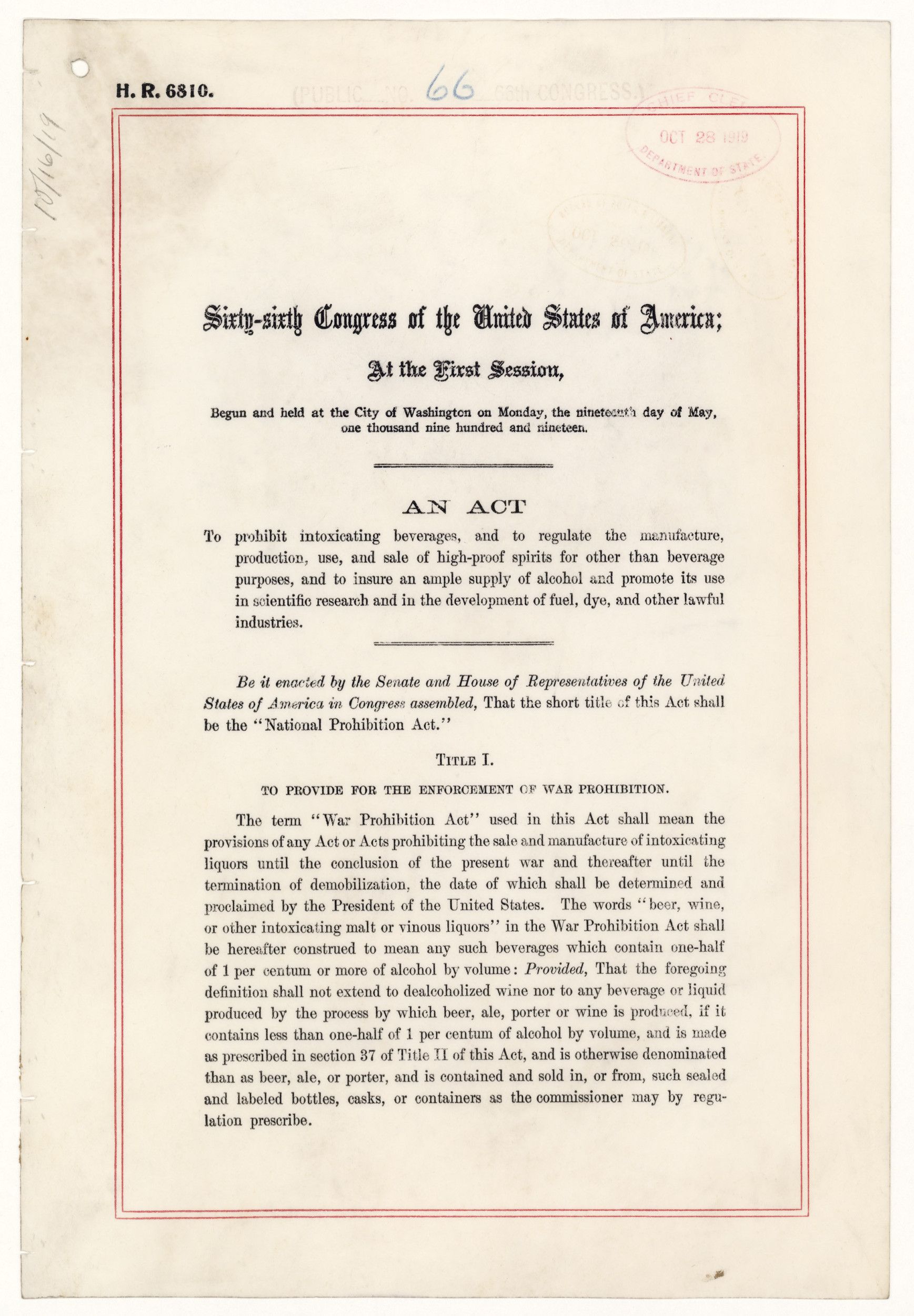
Act of October 28, 1919 [Volstead Act]
Page 2
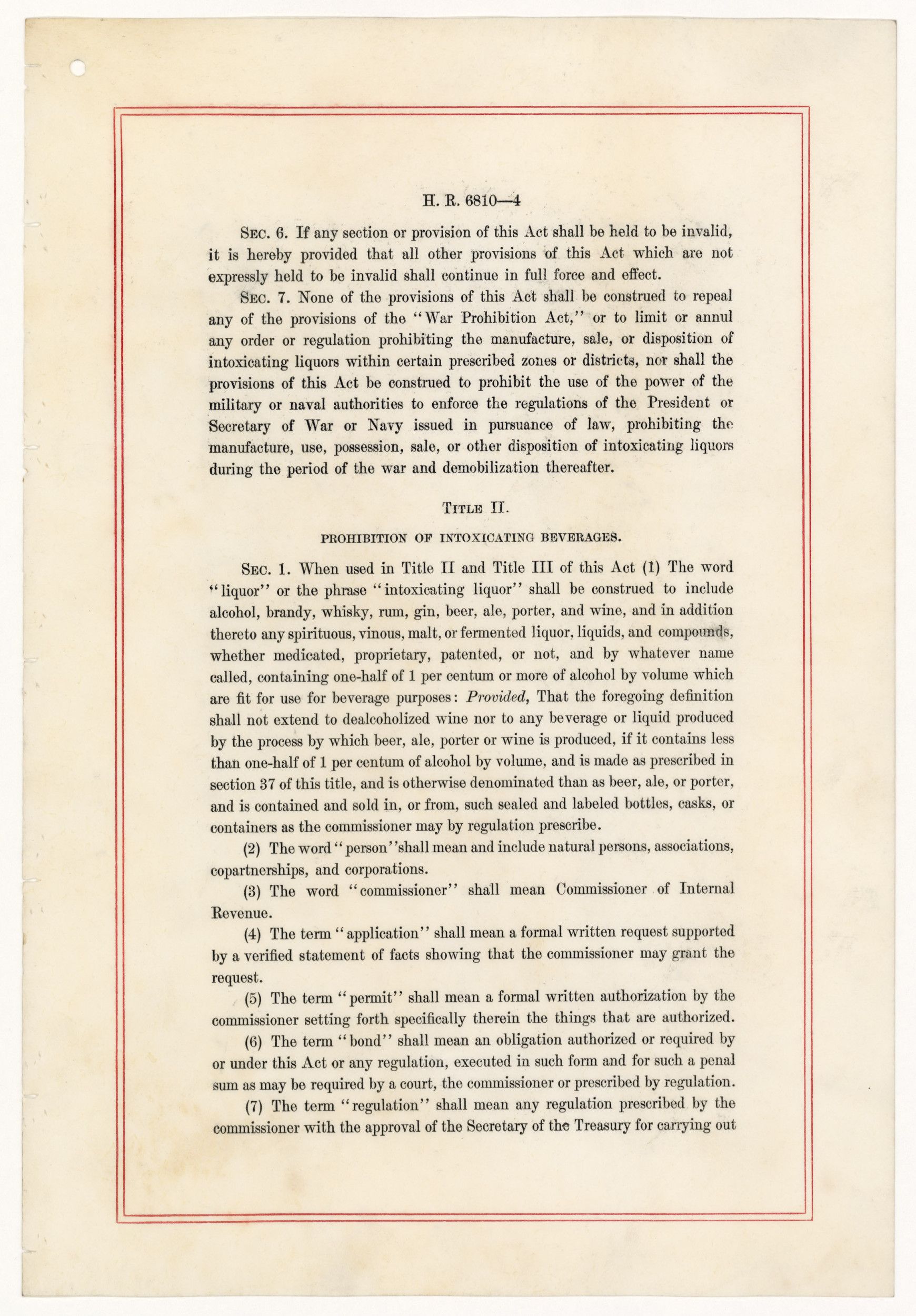
Document
Detroit police inspecting equipment found in a clandestine underground brewery during the prohibition era
This primary source comes from the Records of the U.S. Information Agency.
National Archives Identifier: 541928
Full Citation: Detroit police inspecting equipment found in a clandestine underground brewery during the prohibition era; Records of the U.S. Information Agency, . [Online Version, https://www.docsteach.org/documents/document/detroit-police-inspecting-equipment-found-in-a-clandestine-underground-brewery-during-the-prohibition-era, April 26, 2024]Detroit police inspecting equipment found in a clandestine underground brewery during the prohibition era
Page 1
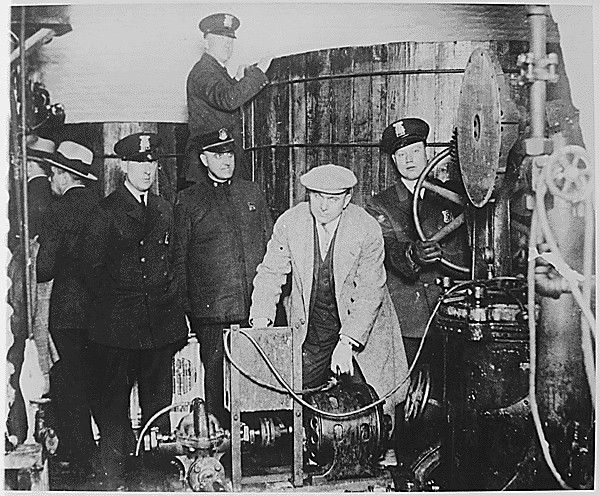
Document
Letter from Mrs. Hillyer concerning her husband's drinking activities.
9/22/1931
This document pertains to the Seattle Conspiracy case, in which the Bureau of Prohibition investigated a conspiracy by members of the Seattle Police department and other government officials in the city to obtain protection money from those violating the National Prohibition Act. Members also sold confiscated liquor for profit. Included in the conspiracy was Frank Olmstead, a captain on the police force. His conviction was appealed to the Supreme Court on the grounds that the wire taps used to convict him were unconstitutional. In a dissenting opinion, Justice Brandeis agreed stating that officials should be required to get a search warrant before placing a wiretap on a telephone line.
This primary source comes from the General Records of the Department of the Treasury.
National Archives Identifier: 298490
Full Citation: Letter from Mrs. Hillyer concerning her husband's drinking activities.; 9/22/1931; Seattle Conspiracy (Olmstead) Investigation; Investigative Case Files, 1924–1933; General Records of the Department of the Treasury, ; National Archives at Seattle, Seattle, WA. [Online Version, https://www.docsteach.org/documents/document/letter-from-mrs-hillyer-concerning-her-husbands-drinking-activities, April 26, 2024]Letter from Mrs. Hillyer concerning her husband's drinking activities.
Page 1
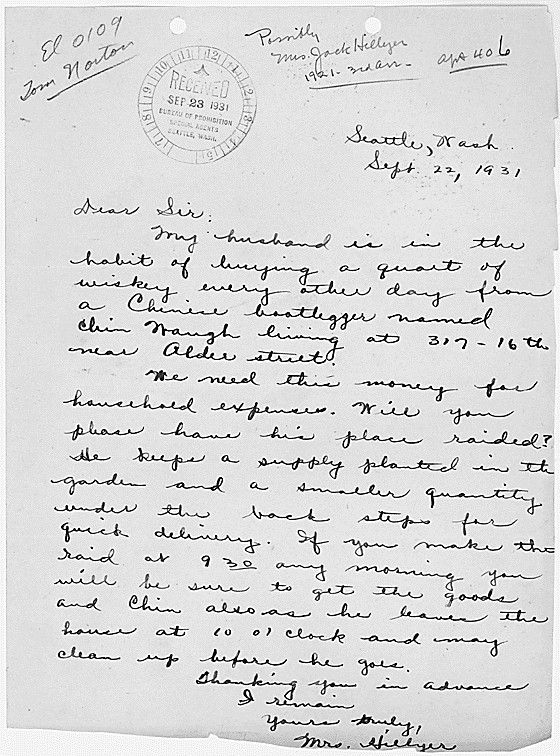
Document
Speaking of Superfluous Starlings
1/10/1930
Enforcement of prohibition laws proved extremely difficult. Many Americans did not agree with the decade long prohibition of the shipment and sales of alcoholic beverages. Not only were the laws being flaunted openly, organized crime groups were becoming more and more involved in all phases of the liquor business. Cartoonist Clifford Berryman spoofs the efforts of the Federal Law Enforcement Commission as it readied its first annual report to the Congress. Their main conclusion: "We find something must be done."
This primary source comes from the Records of the U.S. Senate.
National Archives Identifier: 6012008
Full Citation: Speaking of Superfluous Starlings; 1/10/1930; Records of the U.S. Senate, . [Online Version, https://www.docsteach.org/documents/document/speaking-of-superfluous-starlings, April 26, 2024]Speaking of Superfluous Starlings
Page 1
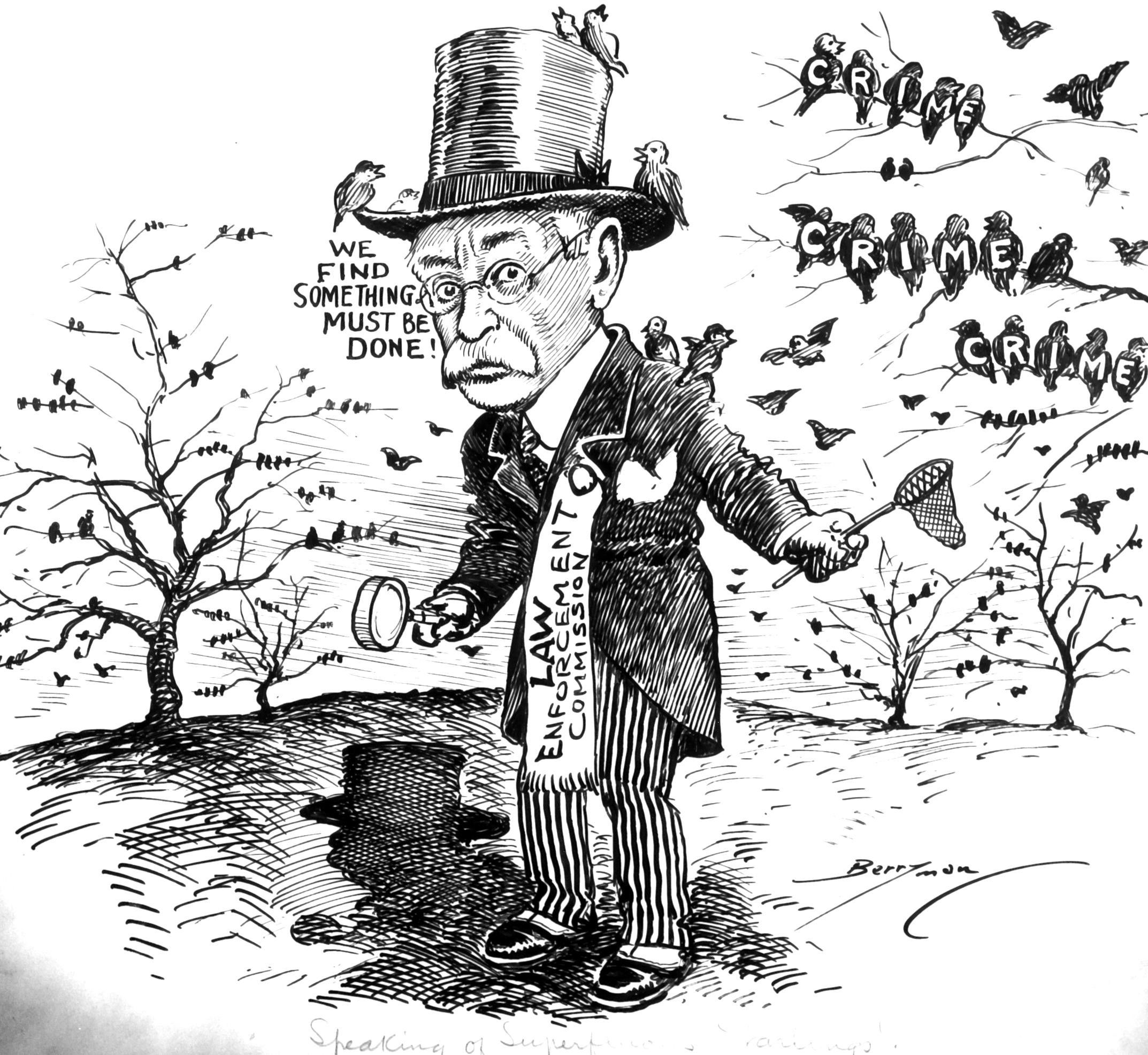
Document
A Message to the President and the Congress of the United States of America from the National Service and War-Time Commissions of the American Churches
5/14/1918
This document comes from a series of petitions and memorials sent to the House of Representatives. The problems associated with the adoption of a national policy regarding alcoholic liquor constituted a continuing subject of petitions both before and after the passage of the 18th Amendment.
This primary source comes from the Records of the U.S. House of Representatives.
National Archives Identifier: 16764582
Full Citation: A Message to the President and the Congress of the United States of America from the National Service and War-Time Commissions of the American Churches; 5/14/1918; Records of the U.S. House of Representatives, . [Online Version, https://www.docsteach.org/documents/document/a-message-to-the-president-and-the-congress-of-the-united-states-of-america-from-the-national-service-and-wartime-commissions-of-the-american-churches, April 26, 2024]A Message to the President and the Congress of the United States of America from the National Service and War-Time Commissions of the American Churches
Page 1

A Message to the President and the Congress of the United States of America from the National Service and War-Time Commissions of the American Churches
Page 2

A Message to the President and the Congress of the United States of America from the National Service and War-Time Commissions of the American Churches
Page 3
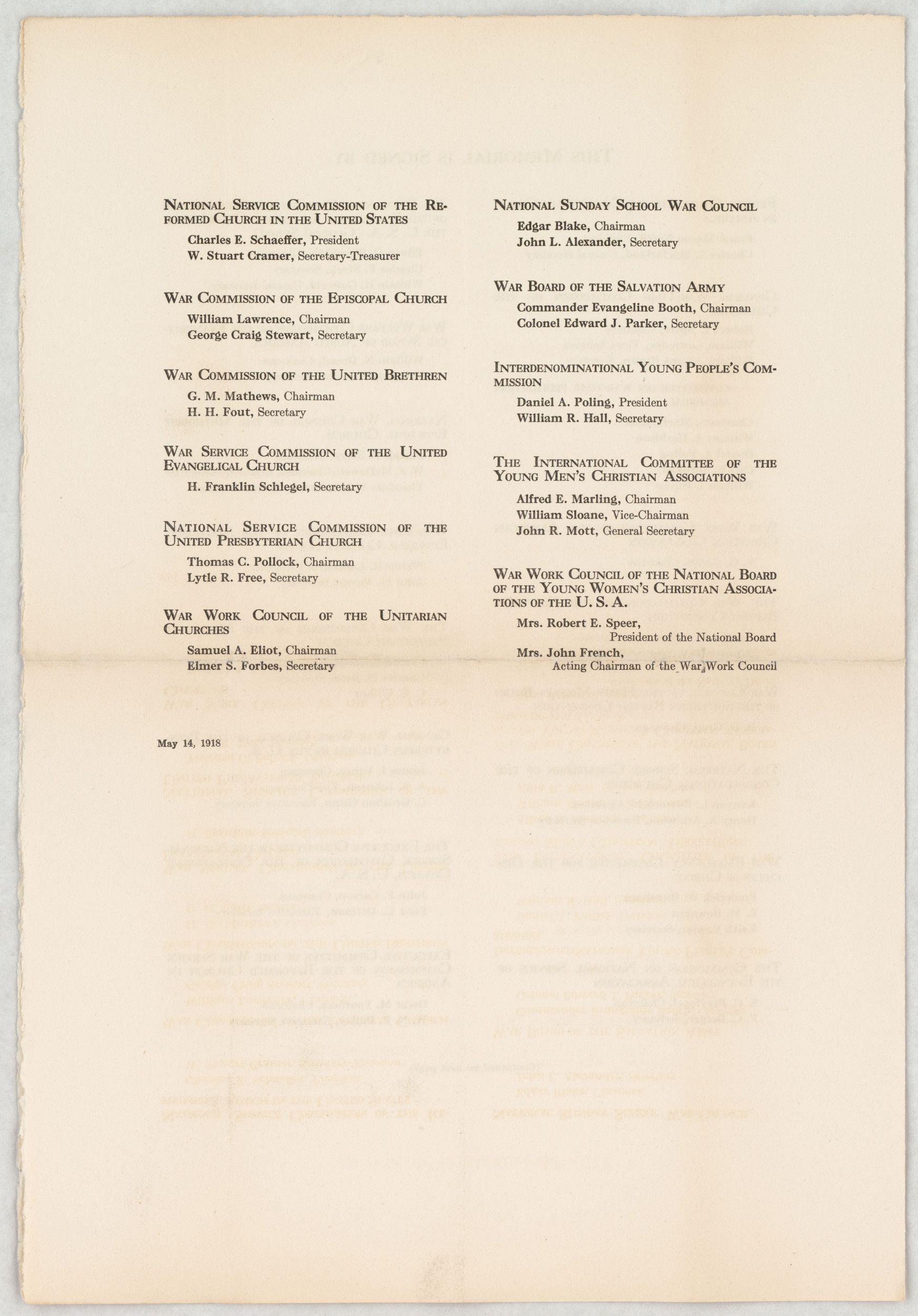
Document
Prescription for Whiskey for I. F. Johnson
1/3/1924
This primary source comes from the Records of the Internal Revenue Service.
National Archives Identifier: 16647176
Full Citation: Prescription for Whiskey for I. F. Johnson; 1/3/1924; Records of the Internal Revenue Service, . [Online Version, https://www.docsteach.org/documents/document/prescription-for-whiskey-for-i-f-johnson, April 26, 2024]Prescription for Whiskey for I. F. Johnson
Page 1
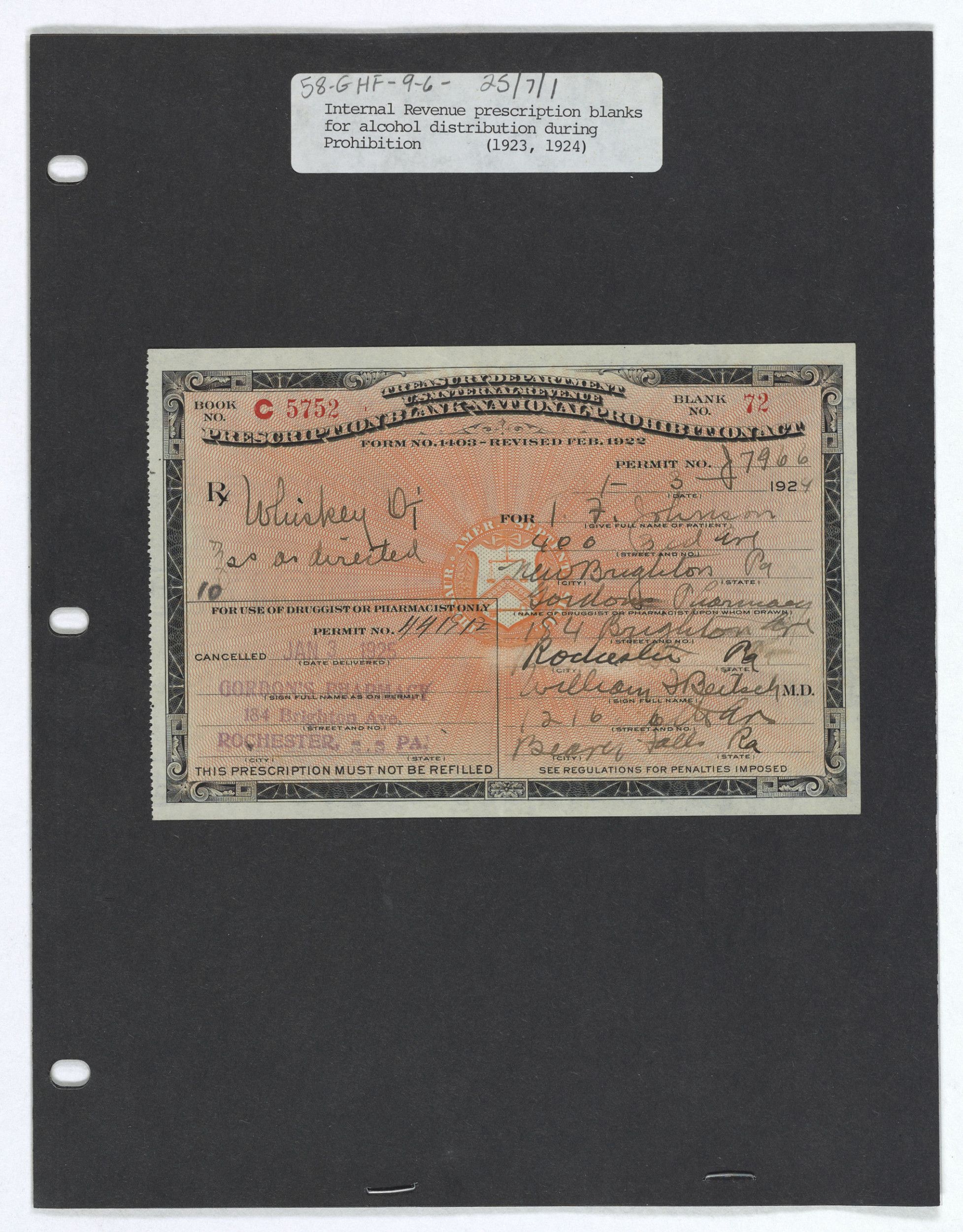
Document
Dr. L. E. Keeley's Double Chloride of Gold Cure for Drunkenness Label
8/10/1880
This primary source comes from the Records of the Patent and Trademark Office.
National Archives Identifier: 16972140
Full Citation: Dr. L. E. Keeley's Double Chloride of Gold Cure for Drunkenness Label; 8/10/1880; 2324 - Dr. L. E. Keeley's Double Chloride of Gold Cure for Drunkenness - Leslie E. Keeley; Case Files for Registered Product Labels , 1874 - 1940; Records of the Patent and Trademark Office, ; National Archives at College Park, College Park, MD. [Online Version, https://www.docsteach.org/documents/document/keeleys-cure-drunkenness, April 26, 2024]Dr. L. E. Keeley's Double Chloride of Gold Cure for Drunkenness Label
Page 1
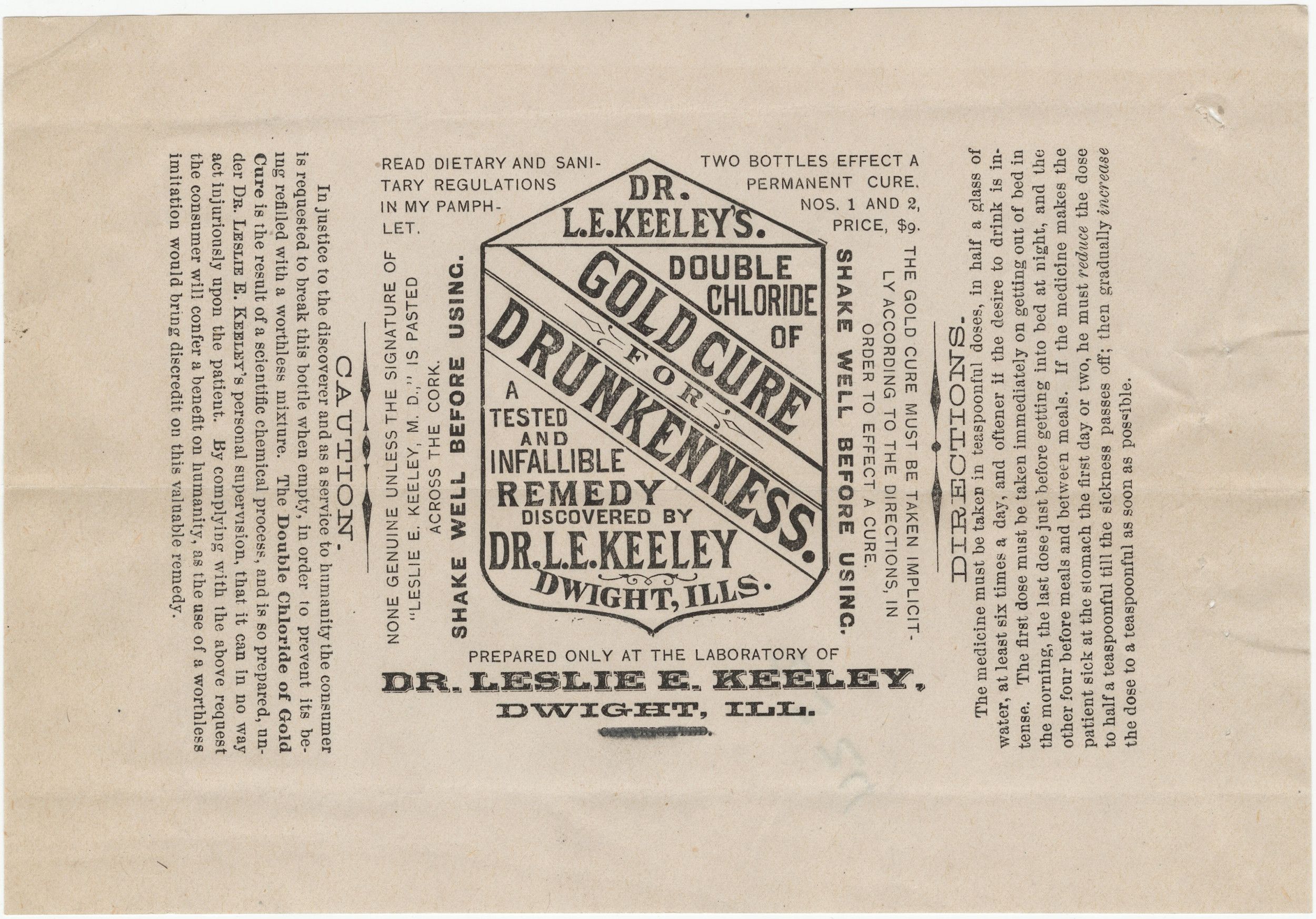
Document
An Automobile Decked Out with Signs and Banners Supporting the Repeal of the 18th Amendment
5/1932
This image is part of a series of photographs which comprised the N.Y. Times photo morgue for the Paris Bureau of the newspaper.
This primary source comes from the Records of the U.S. Information Agency.
National Archives Identifier: 16647184
Full Citation: An Automobile Decked Out with Signs and Banners Supporting the Repeal of the 18th Amendment; 5/1932; Records of the U.S. Information Agency, . [Online Version, https://www.docsteach.org/documents/document/an-automobile-decked-out-with-signs-and-banners-supporting-the-repeal-of-the-18th-amendment, April 26, 2024]An Automobile Decked Out with Signs and Banners Supporting the Repeal of the 18th Amendment
Page 1
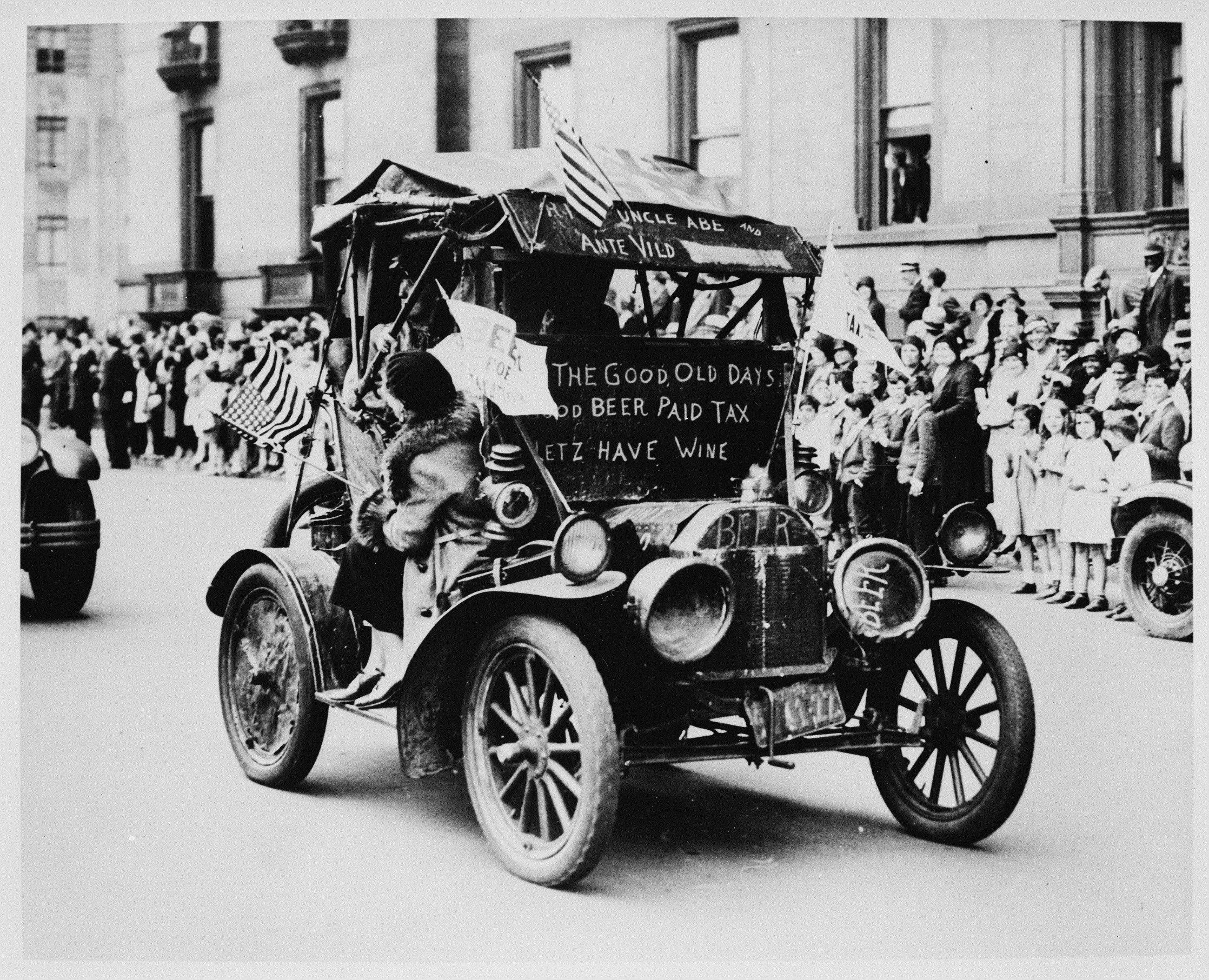
Document
Letter from Women's Committee for Repeal of the 18th Amendment to the United States Congress Regarding the Repeal of Prohibition
1/25/1930
This primary source comes from the Records of the U.S. House of Representatives.
National Archives Identifier: 16764535
Full Citation: Letter from Women's Committee for Repeal of the 18th Amendment to the United States Congress Regarding the Repeal of Prohibition; 1/25/1930; Records of the U.S. House of Representatives, . [Online Version, https://www.docsteach.org/documents/document/letter-from-womens-committee-for-repeal-of-the-18th-amendment-to-the-united-states-congress-regarding-the-repeal-of-prohibition, April 26, 2024]Letter from Women's Committee for Repeal of the 18th Amendment to the United States Congress Regarding the Repeal of Prohibition
Page 1
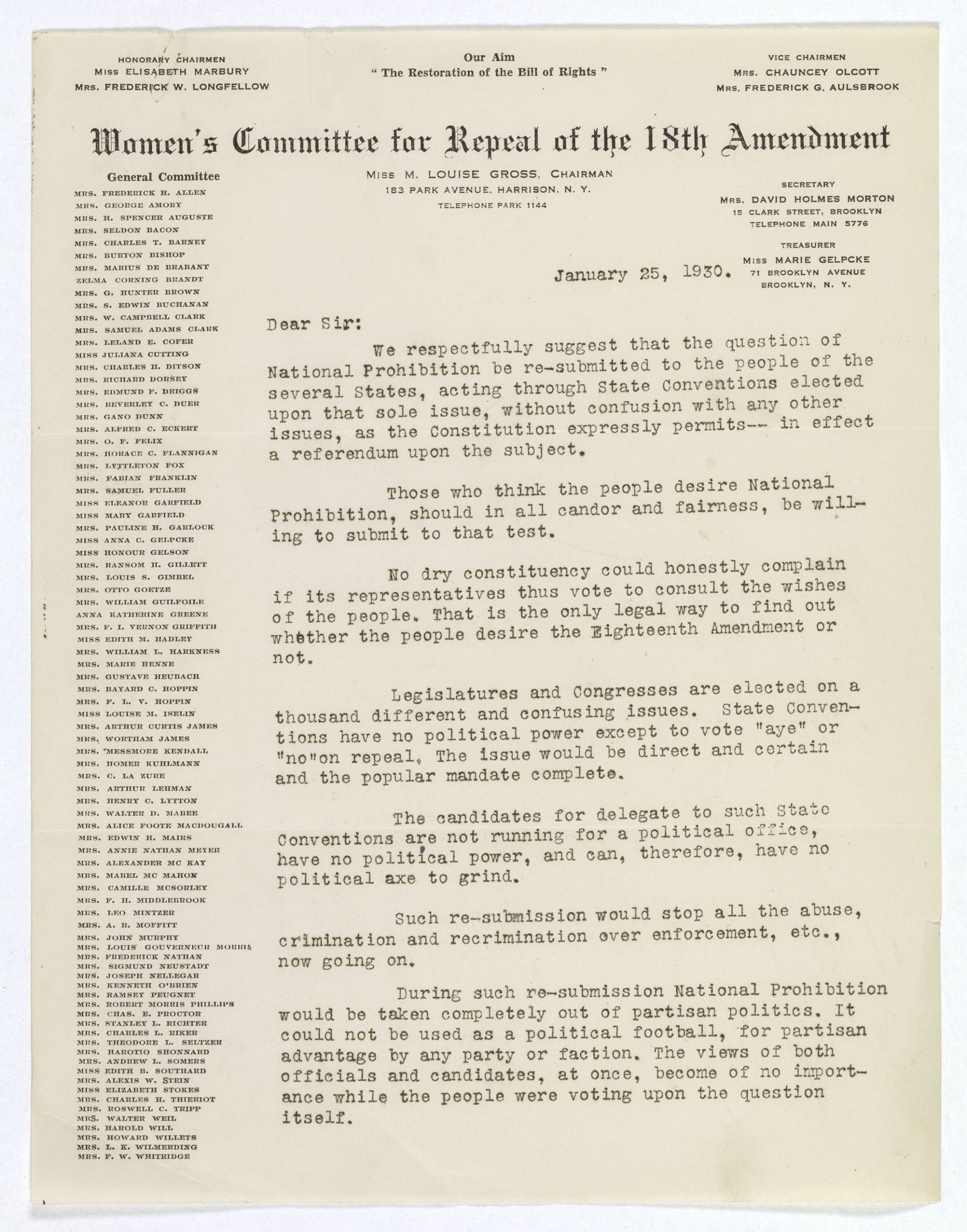
Letter from Women's Committee for Repeal of the 18th Amendment to the United States Congress Regarding the Repeal of Prohibition
Page 2
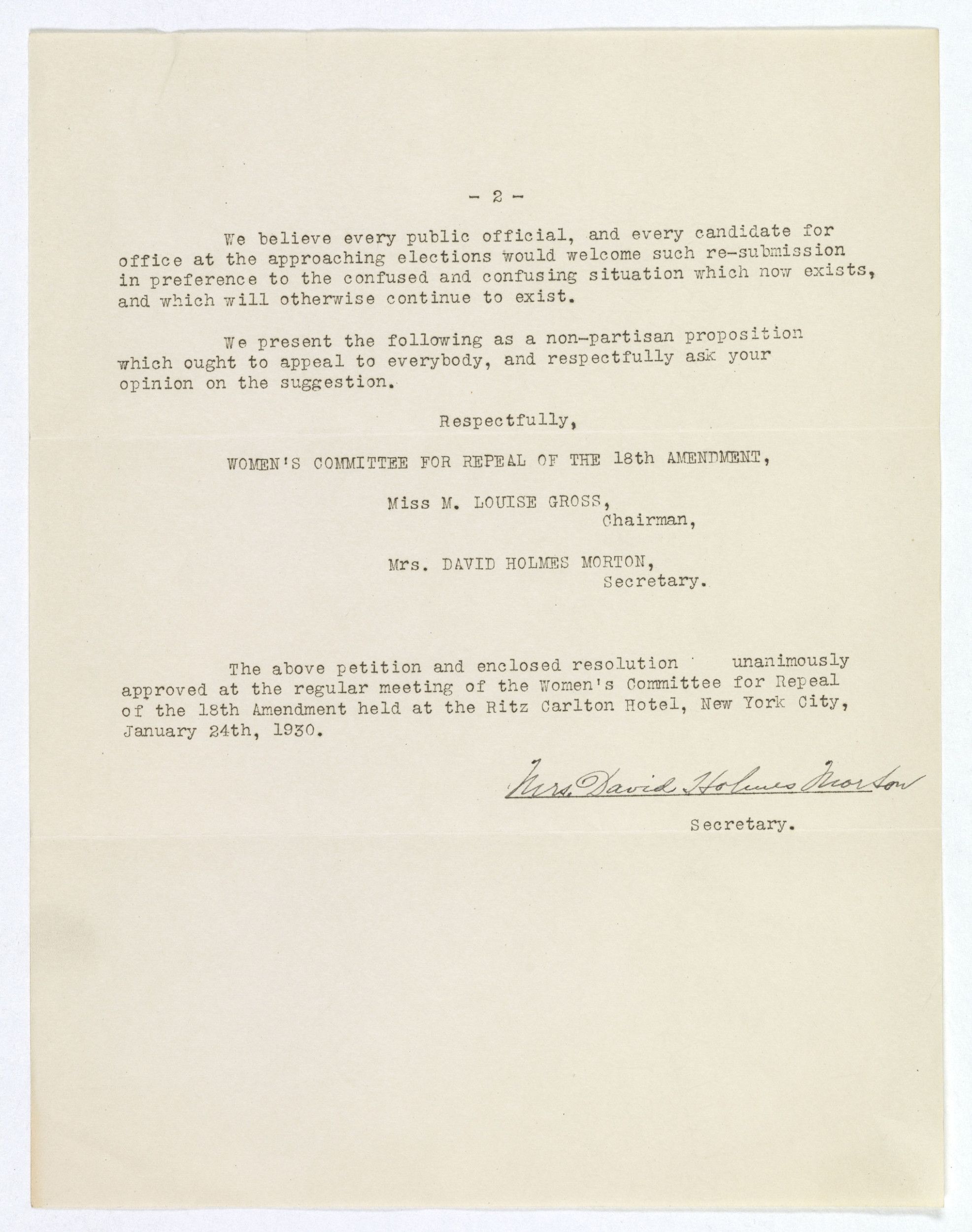
Document
Presidential Proclamation 2065 in which President Franklin D. Roosevelt announces the Repeal of Prohibition
12/5/1933
In Presidential Proclamation 2065, President Franklin D. Roosevelt announced the repeal of Prohibition.
Transcript
DATE OF REPEAL OF THE EIGHTEENTH AMENDMENTBY THE PRESIDENT OF THE UNITED STATES OF AMERICA
A PROCLAMATION
WHEREAS the Congress of the United States in second session of the Seventy-second Congress, begun at Washington on the fifth day of December in the year one thousand nine hundred and thirty-two, adopted a resolution in the words and figures following, to wit:
"JOINT RESOLUTION
Proposing an amendment to the Constitution of the United States.
"Resolved by the Senate and House of Representatives of the United States of America in Congress assembled (two-thirds of each House concurring therein), That the following article is hereby proposed as an amendment to the Constitution of the United States, which shall be valid to all intents and purposes as part of the Constitution when ratified by conventions in three-fourths of the several States:
"'Article--
"'Section 1. The eighteenth article of amendment to the Constitution of the United States is hereby repealed.
DATE OF REPEAL OF THE EIGHTEENTH AMENDMENT
BY THE PRESIDENT OF THE UNITED STATES OF AMERICA
A PROCLAMATION
WHEREAS the Congress of the United States in second session of the Seventy-second Congress, begun at Washington on the fifth day of December in the year one thousand nine hundred and thirty-two, adopted a resolution in the words and figures following, to wit:
"JOINT RESOLUTION
Proposing an amendment to the Constitution of the United States.
"Resolved by the Senate and House of Representatives of the United States of America in Congress assembled (two-thirds of each House concurring therein), That the following article is hereby proposed as an amendment to the Constitution of the United States, which shall be valid to all intents and purposes as part of the Constitution when ratified by conventions in three-fourths of the several States:
"'Article--
"'Section 1. The eighteenth article of amendment to the Constitution of the United States is hereby repealed.
-3-
WHEREAS it appears from a certificate issued December 5, 1933, by the Acting Secretary of State that official notices have been received in the Department of State that on the fifth day of December 1933 conventions in 36 States of the United States, constituting three fourths of the whole number of the States had ratified the said repeal amendment;
NOW, THEREFORE, I, FRANKLIN D. ROOSEVELT, President of the United States of America, pursuant to the provisions of section 217 (a) of the said act of June 16, 1933, do hereby proclaim that the eighteenth amendment to the Constitution of the United States was repealed on the fifth day of December 1933.
FURTHERMORE, I enjoin upon all citizens of the United States and upon others resident within the jurisdiction thereof to cooperate with the Government in its endeavor to restore greater respect for law and order, by confining such purchases of alcoholic beverages as they may make solely to those dealers or agencies which have been duly licensed by State or Federal license.
Observance of this request, which I make personally to every individual and every family in our Nation, will result in the consumption of alcoholic beverages which have passed Federal inspection, in the break-up and eventual destruction of the notoriously evil illicit liquor traffic, and in the payment of reasonable taxes for the support of Government and thereby in the superseding of other forms of taxation.
-4-
I call specific attention to the authority given by the twenty-first amendment to the Government to prohibit transportation or importation of intoxicating liquors into any State in violation of the laws of such State.
I ask the whole-hearted cooperation of all our citizens to the end that this return of individual freedom shall not be accompanied by the repugnant conditions that obtained prior to the adoption of the eighteenth amendment and those that have existed since its adoption. Failure to do this honestly and courageously will be a living reproach to us all.
I ask especially that no State shall by law or otherwise authorize the return of the saloon either in its old form or in some modern guise.
The policy of the Government will be to see to it that the social and political evils that have existed in the pre-prohibition era shall not be revived nor permitted again to exist. We must remove forever from our midst the menace of the bootlegger and such others as would profit at the expense of good government, law, and order.
I trust in the good sense of the American people that they will not bring upon themselves the curse of excessive use of intoxicating liquors, to the detriment of health, morals, and social integrity.
The objective we seek through a national policy is the education of every citizen towards a greater temperance throughout the Nation.
-5-
IN WITNESS WHEREOF, I have hereunto set my hand and caused the seal of the United States to be affixed.
DONE at the City of Washington this fifth day of December, in the year of our Lord nineteen hundred and thirty-three, and of the Independence of the United States of America the one hundred and fifty-eighth.
Franklin D. Roosevelt
By the President:
William Phillips
Acting Secretary of State.
This primary source comes from the General Records of the United States Government.
National Archives Identifier: 299967
Full Citation: Presidential Proclamation 2065 in which President Franklin D. Roosevelt announces the Repeal of Prohibition; 12/5/1933; Presidential Proclamations, 1791 - 2011; General Records of the United States Government, ; National Archives Building, Washington, DC. [Online Version, https://www.docsteach.org/documents/document/repeal-prohibition, April 26, 2024]Presidential Proclamation 2065 in which President Franklin D. Roosevelt announces the Repeal of Prohibition
Page 1

Presidential Proclamation 2065 in which President Franklin D. Roosevelt announces the Repeal of Prohibition
Page 2

Presidential Proclamation 2065 in which President Franklin D. Roosevelt announces the Repeal of Prohibition
Page 3
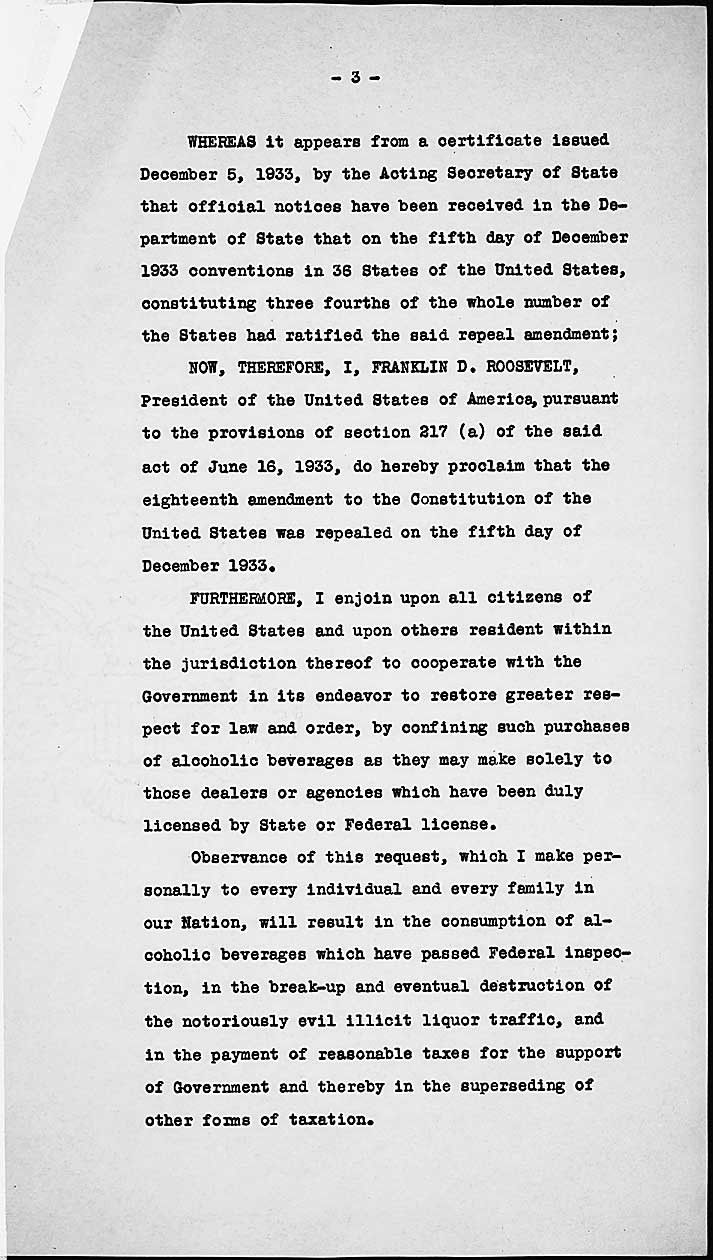
Presidential Proclamation 2065 in which President Franklin D. Roosevelt announces the Repeal of Prohibition
Page 4
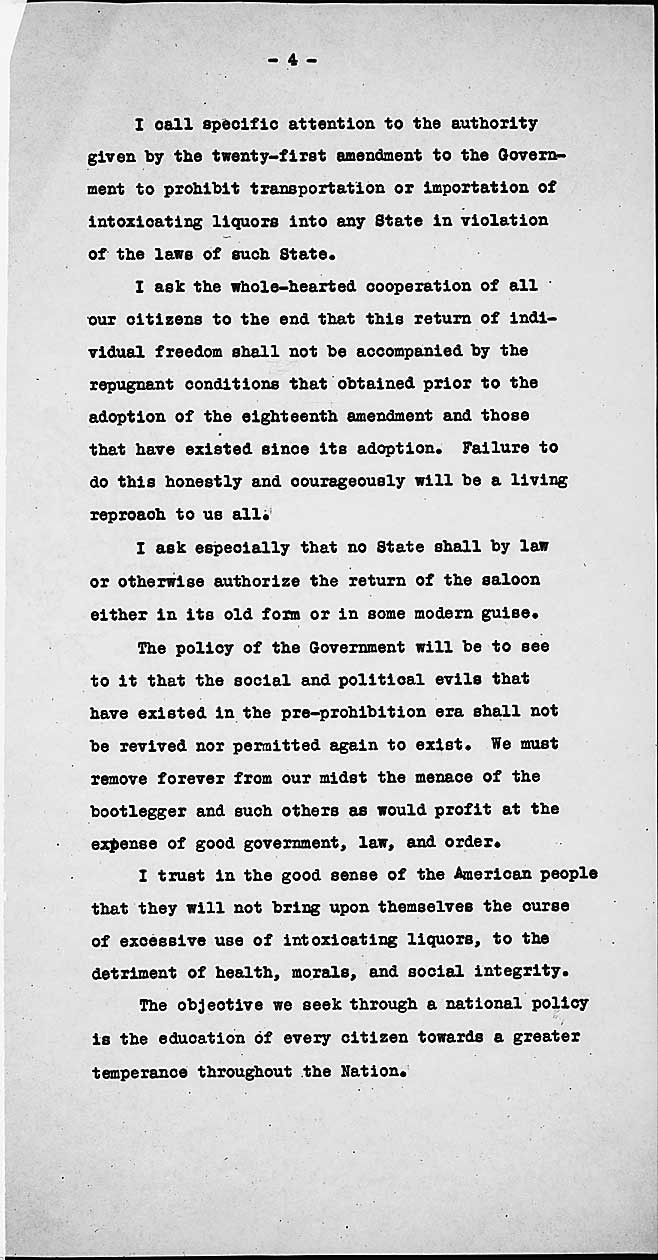
Presidential Proclamation 2065 in which President Franklin D. Roosevelt announces the Repeal of Prohibition
Page 5

